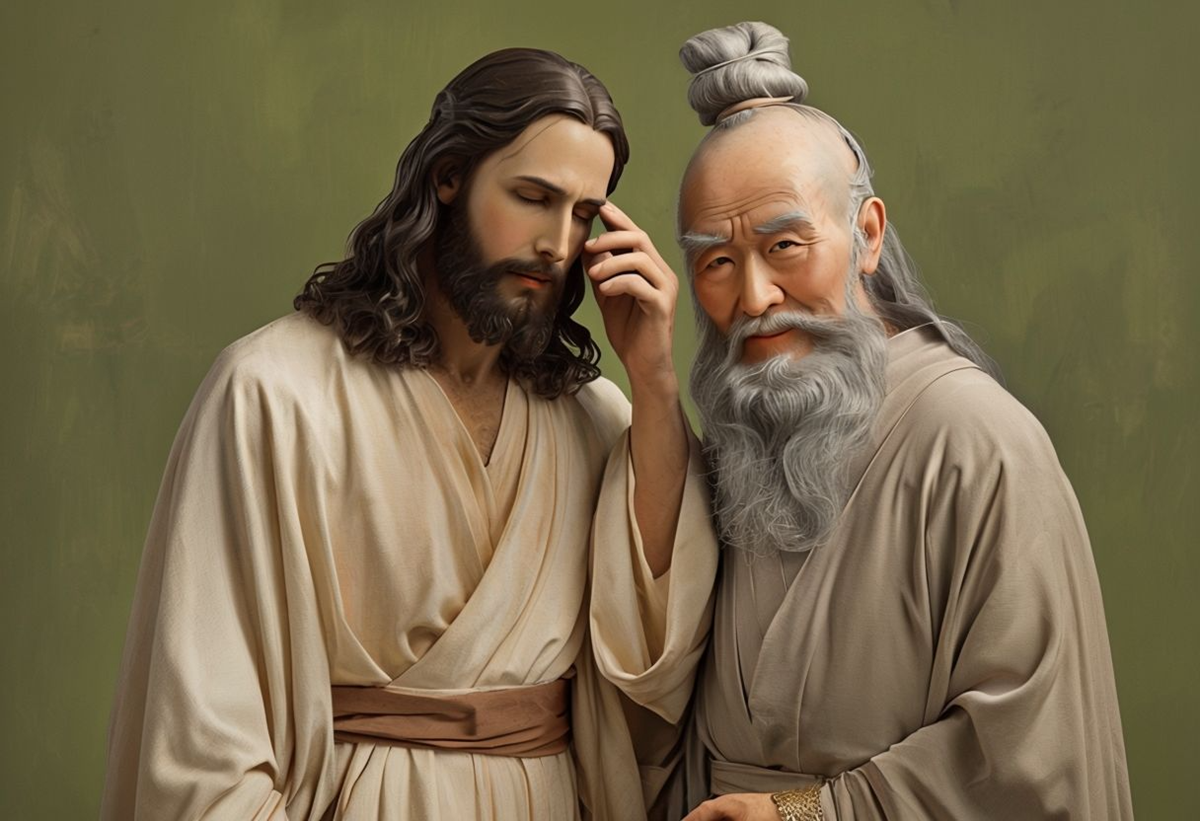Do you feel misunderstood because of your spirituality? When the spiritual life feels lonely, Jesus & Lao Tzu understand.

Lao Tzu often writes about the difficult life of a sage. He suffers ridicule and feels he is blown by the wind. Or, at least, he is aware that people regard him as unstable. Yet, Lao knows that he possesses a sage’s wisdom. This insight comes from his ability to refrain from differentiating between yes and no, good and evil, light and dark. His understanding sets him apart from others.
Wisdom itself is a blessing, but the sage’s loneliness is a curse. So, the one who follows the Tao must be willing to take up this same Path. If the spiritual path is lonely for you, then you’re in good company. Here’s what Lao Tzu says in the twentieth verse of the Tao Te Ching:
Lao Tzu’s Tao Te Ching, Verse 20
J.H. McDonald Version
Renounce knowledge and your problems will end.
What is the difference between yes and no?
What is the difference between good and evil?
Must you fear what others fear?
Nonsense, look how far you have missed the mark!Other people are joyous,
as though they were at a spring festival.
I alone am unconcerned and expressionless,
like an infant before it has learned to smile.Other people have more than they need;
I alone seem to possess nothing.
I am lost and drift about with no place to go.
I am like a fool, my mind is in chaos.Ordinary people are bright;
I alone am dark.
Ordinary people are clever;
I alone am dull.
Ordinary people seem discriminating;
I alone am muddled and confused.
I drift on the waves on the ocean,
blown at the mercy of the wind.
Other people have their goals,
I alone am dull and uncouth.I am different from ordinary people.
I nurse from the Great Mother’s breasts.
The Suffering Servant
If Lao Tzu expresses his lonely path, then Jesus shares in the sage’s separateness. In the Suffering Servant passage of Isaiah, we find a similar character who is simultaneously gifted and cursed. The prophet writes:
Who has believed what we have heard?
And to whom has the arm of the Lord been revealed?
For he grew up before him like a young plant
and like a root out of dry ground;
he had no form or majesty that we should look at him,
nothing in his appearance that we should desire him.
He was despised and rejected by others;
a man of suffering and acquainted with infirmity,
and as one from whom others hide their faces
he was despised, and we held him of no account.
Surely he has borne our infirmities
and carried our diseases,
yet we accounted him stricken,
struck down by God, and afflicted.
One Christian interpretation is that this Hebrew scripture refers to Jesus Christ. Rather than appearing in majesty, God displays humility through Jesus. Born in a stable, raised in a backwater town, and apprenticed as a carpenter, Jesus exhibits no remarkable qualities. The prophet declares that there is nothing particularly attractive about him. In fact, many of Jesus’s contemporaries consider him despised and rejected, unclean and afflicted. Being misunderstood is what it means to be a sage—Lao Tzu and Jesus know this well.
Balanced Minds
Both sages understood the stings of sorrow and the groans of grief. Neither hid his tears or emotional distress. Yet, neither is it likely that they suffered from major depressive disorder. Instead, these scriptures indicate balance in the minds of the two sages. While on the one hand, Jesus and Lao Tzu enjoyed their lives, they also knew sorrow and were acquainted with grief. Further still, each was able to stand back and observe rather than getting embroiled in the dramas of people around them.
Renounce Knowledge
Lao Tzu writes, “Renounce knowledge, and your problems will end. What is the difference between yes and no? What is the difference between good and evil? Must you fear what others fear? Nonsense, look how far you have missed the mark!” Lao understood that those with balanced minds must abandon their tendency to elevate themselves as the judge of other people. Similarly, although Jesus said he possessed the authority to judge, he declared that he himself judges no one. Likewise, Jesus taught his followers not to judge good and evil.
Fear No Evil
Once, Jesus sent his disciples on a preaching mission. When they returned and told all the wondrous things that accompanied their teaching, Jesus said, “I watched Satan fall from heaven like a flash of lightning.” By announcing Satan’s demise, Jesus proclaimed that evil was nothing to be feared. In fact, he said, “Indeed, I have given you authority to tread on snakes and scorpions and over all the power of the enemy, and nothing will hurt you. Nevertheless, do not rejoice at this, that the spirits submit to you, but rejoice that your names are written in heaven.” This was Jesus’s metaphorical way of telling them not to fear contact with evil. Fear of evil is often greater than the evil thing itself. Yet, walking in freedom means interacting without fear or judgment.
Being Born Again
Lao Tzu writes, “Other people are joyous, as though they were at a spring festival. I alone am unconcerned and expressionless, like an infant before it has learned to smile.” Perhaps this is what Jesus meant when he said we cannot enter the kingdom of heaven unless we come as a little child. Or that we must be born again. Being born again means learning to renew our ability to be observant. It means encountering the world in a fresh way. Being born again means not getting involved with either extremes of ecstasy or melancholy but drawing your source of energy by nursing from the breasts of the Tao.
Possessing Nothing
“Other people have more than they need,” Lao Tzu writes. “I alone seem to possess nothing. I am lost and drift about with no place to go. I am like a fool, my mind is in chaos.” Lao knew that having too many possessions leads to an overly complicated life. Freedom comes from detachment. These words echo those of Jesus, when one of the preacher’s followers asked to come along on his journeys. The Teacher replied, “Foxes have holes, and birds of the air have nests, but the Son of Man has nowhere to lay his head.” To those who live attached to all the world has to offer, such detachment from the world seems like a mind in chaos.
Dark, Dull, Muddled, & Confused
Lao Tzu says, “Ordinary people are bright; I alone am dark. Ordinary people are clever; I alone am dull. Ordinary people seem discriminating, I alone am muddled and confused. I drift on the waves on the ocean, blown at the mercy of the wind. Other people have their goals, I am alone, and dull and uncouth.” Isaiah’s Suffering Servant shares this affliction. Again, the Son of Man has nothing desirable about him, no form or comeliness that the world would desire him. From the world’s perspective, people like Jesus and Lao Tzu are dark, dull, muddled, and confused. From an earthly vantage point, there’s nothing attractive about this way of life.
The Way of the Wind
If you’re looking for a life of excitement, following the Tao is going to disappoint. Some might say that following the Way of Love is pointless. Lao Tzu says that he drifts on the ocean waves, blown at the mercy of the wind. Jesus says something similar. “The wind blows where it chooses, and you hear the sound of it, but you do not know where it comes from or where it goes. So it is with everyone who is born of the Spirit.” When people are unmotivated by ambition, pride, hunger, quest for knowledge or other earthly causes, but instead follow the Tao, the world considers them unmoored and even a little unhinged. Yet, such sages are guided by the unseen Tao. The Way of the Wind is a spiritual Path indiscernible to those who follow the way of the world. For this reason it can seem lonely.
When the Spiritual Life Feels Lonely
“Other people have their goals,” writes Lao Tzu. “In the eyes of the world, I alone am dull and uncouth. I am different from ordinary people.” The spiritual Way is the middle road between the worldly path and the religious one. In the worldly path, people follow earthly motivations. In the religious path, people follow motives they assume are heavenly. But the spiritual path is a third way, following the spirit that blows wherever it will. It may be lonely on the wind-blown mountaintop, but it’s definitely worth the climb.
Practice
It can be difficult and solitary, living the life of a sage. Both masters frequently expressed the feeling of being alienated and misunderstood. Lao Tzu and Jesus knew that they had to surround themselves with others who were seeking a spiritual path. This is why it’s important to find a likeminded community where you can be yourself.
This will look different for each individual. For some Christians, this means going to church. Yet, other Jesus Followers will find church stifling. This will vary greatly, depending on the unique experience of church. Often, believers who see themselves as thought and theology police may cause problems for the Christian who expresses interest in the Tao. You must exercise caution in who you trust with this kind of spirituality.
Still, living a spiritual life without loneliness means finding friendship on some level with people who can support you in your faith. As part of your spiritual development, consider finding a faith community where you can worship, serve, share, and practice. It may be best to divide your spiritual relationships between multiple groups.
This might mean being part of both a church and a Buddhist sangha, or a church and Taoist daoguan. Or, it could simply be a book club or gardening group where you can put your spirituality into practice along with friends of like mind. In any case, consider combating loneliness by practicing your faith in a group setting. Being a spiritual person is a bit easier when you have others who “get” you.
For related reading, check out my other articles:
- Renaming God: The Way, The Tao, & New Perspectives
- Jesus & Lao Tzu’s Judgement-Free Zone
- Jesus, Lao Tzu, & Winnie the Pooh on Emptying Yourself














